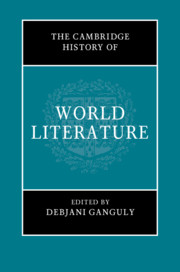Book contents
- The Cambridge History of World Literature
- The Cambridge History of World Literature
- Copyright page
- Contents
- Figures
- Contributors
- Acknowledgements
- Introduction
- Part I Genealogies
- Part II Thinking the World
- Part III Transregional Worlding
- Part IV Cartographic Shifts
- Part V World Literature and Translation
- Part VI Poetics, Genre, Intermediality
- Part VII Scales, Polysystems, Canons
- Part VIII Modes of Reading and Circulation
- 40 Transregional Critique and the Challenge of Comparison: Between Latin America and China
- 41 Reading World Literature through the Postcolonial and Diasporic Lens
- 42 The Indian Republic, Reading Publics, and World Literary Catalogues
- 43 The Cultural Industry and Digital World Making
- Part IX The Worldly and the Planetary
- Index
- References
43 - The Cultural Industry and Digital World Making
from Part VIII - Modes of Reading and Circulation
Published online by Cambridge University Press: 17 August 2021
- The Cambridge History of World Literature
- The Cambridge History of World Literature
- Copyright page
- Contents
- Figures
- Contributors
- Acknowledgements
- Introduction
- Part I Genealogies
- Part II Thinking the World
- Part III Transregional Worlding
- Part IV Cartographic Shifts
- Part V World Literature and Translation
- Part VI Poetics, Genre, Intermediality
- Part VII Scales, Polysystems, Canons
- Part VIII Modes of Reading and Circulation
- 40 Transregional Critique and the Challenge of Comparison: Between Latin America and China
- 41 Reading World Literature through the Postcolonial and Diasporic Lens
- 42 The Indian Republic, Reading Publics, and World Literary Catalogues
- 43 The Cultural Industry and Digital World Making
- Part IX The Worldly and the Planetary
- Index
- References
Summary
This chapter addresses the dynamics of world literature from a postcolonial angle, integrating the role of the cultural industry in the dynamics of literature across borders. It focuses on the role of texts in reshaping cosmopolitan imaginaries, accounting for the tension between commercialization and the politics of resistance. In particular, the chapter addresses the role of digital technologies in articulating the worldliness of literature not just through circulation and reception but also through new narrative strategies and tropes that open up new scenarios for thinking and imagining migration beyond the limits of borders and geography. It takes as case studies Chimamanda Adichie’s Americanah (2013), in which blogging is used as a form of advocacy, Hamid Mohsin’s Exit/West, which introduces the expedient of magic doors as portals to overcome the sense of stuckness of migration, and the poems of Warson Shire, who emerges as a prominent new Instapoet capable of cutting across audiences, generations and media platforms.
- Type
- Chapter
- Information
- The Cambridge History of World Literature , pp. 842 - 864Publisher: Cambridge University PressPrint publication year: 2021

